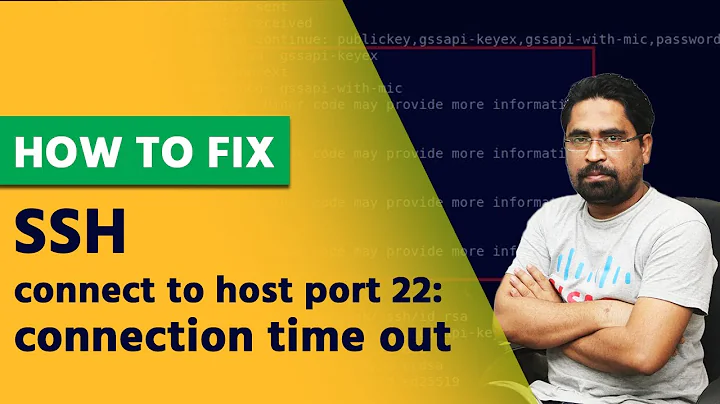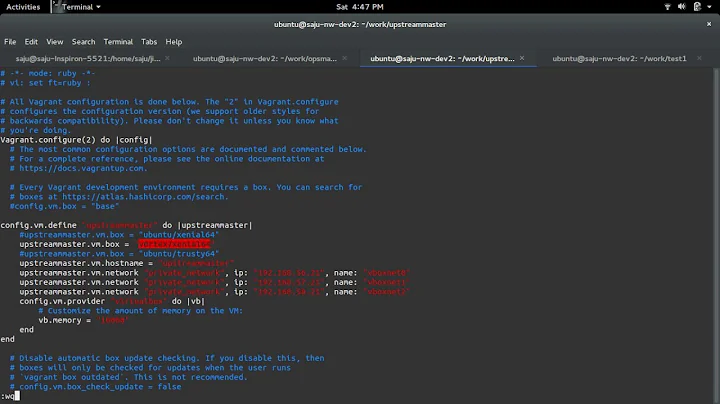PuPHPet, Vagrant and SSH - SSH Connection Timeout
The problem was that PuPHPet.com's CentOS vagrant boxes no longer come with a default set of firewall rules. So, in order to resolve this, boot up the VM using VirtualBox (or whichever hypervisor you are using), then modify and save /etc/sysconfig/ptables to allow your desired services.
In my personal opinion, the best way to edit your iptables' rules is by using a CLI tool which can easily be installed with yum: sudo yum install -y system-config-frewall-tui. This text-based user interface allows you to easily enable / disable standard services (httpd, bind, postfix, nfs, etc) using the wizard, as well as, create custom rules for non-standard ports / services (such as Webmin's port 10000). This tool is a true time saver.
If this doesn't resolve your connectivity issues, in order to rule out whether or not it is firewall related run sudo service iptables off on the guest and attempt SSH access from the host (ssh vagrant@my-host-name-or-ip).
If you have SSH access now, then the issue is going to be a FW problem and you will need to double check your iptables (did you save your changes?). If you are still unable to get SSH access, then it is most likely a networking problem and should be troubleshooted accordingly (check ifconfig, route, pinging from the host to the guest and vice versa, etc).
HTH.
Related videos on Youtube
DroBuddy
Updated on September 18, 2022Comments
-
DroBuddy over 1 year
I built a new CentOS 6.5 vagrant box and after provisioning, the SSH connection keeps timing out. I've attempted the steps in Vagrant ssh fails with VirtualBox but I receive errors (see below). I initially thought that it may be a problem with my /etc/hosts, but after commenting out any potential conflicts I still have the same problem; so, I created an Ubuntu 14.04 vagrant box and that machine booted up flawlessly. Both machine's Vagrantfiles / config.yaml were built using PuPHPet.com.
The host's details:
Host OS: Kubuntu 14.04 (3.13.0-29-generic) Virtualbox: 4.3.12 r93733 Vagrant: 1.6.0 Basebox: puphpet/centos65-x64 (virtualbox, 1.0.1)After editing my Vagrantfile to include directives for enabling the GUI and setting the max retries to 150 (per the above thread), I received the following error messages:
$ vagrant up Bringing machine 'default' up with 'virtualbox' provider... There are errors in the configuration of this machine. Please fix the following errors and try again: SSH: * The following settings shouldn't exist: max_tries vm: * The following settings shouldn't exist: boot_modeSo, I have since removed them. I booted the machine up with VirtualBox, and it came up smoothly.
IP Assigned: 192.168.56.101
The /etc/sysconfig/network-scripts/ifcfg-eth1 has the following config set:
DEVICE="eth1" BOOTPROTO="none" IPV6INIT="yes" MTU="1500" NM_CONTROLLER="yes" ONBOOT="yes" TYPE="Ethernet" #VAGRANT-BEGIN NM_CONTROLLER=no BOOTPROTO=none ONBOOT=yes IPADDR=192.168.56.101 NETMASK=255.255.255.0 DEVICE=eth1 PEERDNS=no #VAGRANT-END[Aside] As I was typing that out (I couldn't copy/paste from the VM CLI unfortunately), I noticed that there was a second declaration for
NM_CONTROLLED, so I am going to comment out theNM_CONTROLLED="yes"now just to clean it up. [/Aside]Moving right along... I'm able to ping the guest from the host; and, I've attempted to ssh using the standard way (ssh [email protected]) but received an error stating
No route to host.$ ping 192.168.56.101 PING 192.168.56.101 (192.168.56.101) 56(84) bytes of data. 64 bytes from 192.168.56.101: icmp_seq=1 ttl=64 time=1.94 ms 64 bytes from 192.168.56.101: icmp_seq=2 ttl=64 time=0.430 ms ^C --- 192.168.56.101 ping statistics --- 2 packets transmitted, 2 received, 0% packet loss, time 1001ms rtt min/avg/max/mdev = 0.430/1.187/1.945/0.758 ms [03:03 PM]-[josej@josej-desktop]-[~/Projects/CentOS-6.5] $ ssh [email protected] ssh: connect to host 192.168.56.101 port 22: No route to hostClearly, there is a route to the host as I can ping it ;). So, I thought that the sshd wasn't running but as we can see below, it is:
[vagrant@localhost ~]$ ps aux | grep sshd root 1321 0.0 0.1 66608 1200 ? Ss 20:02 0:00 /usr/sbin/sshdI was expecting it to refuse the connection since I didn't pass in the SSH key, but since that's not the case and sshd is running.
So, next I tested whether or not the guest could ping Google, which failed. So, checking
routewe see:[vagrant@localhost ~]$ route Kernel IP routing table Destination Gateway Genmask ... Iface 10.0.2.0 * 255.255.255.0 ... eth0 192.168.56.0 * 255.255.255.0 ... eth1So, my best guess is there is a networking problem somewhere. Since the host can ping the guest, and the guest can ping the host (
ping 192.168.56.1works), the route file looks good imo, and the networking config is right, but the guest can't reach any destinations beyond the gateway... I am pretty stumped at this point.I'm going to go poke through the iptables and disable SELinux for the time being. Hopefully that will help flesh out the problem. Anyway, I'm open to any advice as I've been struggling with this for two days now and have only gone in circles.
And, finally, here is the Vagrantfile and puphpet/config.yaml:
require 'yaml' dir = File.dirname(File.expand_path(__FILE__)) configValues = YAML.load_file("#{dir}/puphpet/config.yaml") data = configValues['vagrantfile-local'] Vagrant.configure("2") do |config| config.vm.box = "#{data['vm']['box']}" config.vm.box_url = "#{data['vm']['box_url']}" if data['vm']['hostname'].to_s.strip.length != 0 config.vm.hostname = "#{data['vm']['hostname']}" end if data['vm']['network']['private_network'].to_s != '' config.vm.network "private_network", ip: "#{data['vm']['network']['private_network']}" end data['vm']['network']['forwarded_port'].each do |i, port| if port['guest'] != '' && port['host'] != '' config.vm.network :forwarded_port, guest: port['guest'].to_i, host: port['host'].to_i end end data['vm']['synced_folder'].each do |i, folder| if folder['source'] != '' && folder['target'] != '' nfs = (folder['nfs'] == "true") ? "nfs" : nil if nfs == "nfs" config.vm.synced_folder "#{folder['source']}", "#{folder['target']}", id: "#{i}", type: nfs else config.vm.synced_folder "#{folder['source']}", "#{folder['target']}", id: "#{i}", type: nfs, group: 'www-data', owner: 'www-data', mount_options: ["dmode=775", "fmode=764"] end end end config.vm.usable_port_range = (10200..10500) if data['vm']['chosen_provider'].empty? || data['vm']['chosen_provider'] == "virtualbox" ENV['VAGRANT_DEFAULT_PROVIDER'] = 'virtualbox' config.vm.provider :virtualbox do |virtualbox| data['vm']['provider']['virtualbox']['modifyvm'].each do |key, value| if key == "memory" next end if key == "natdnshostresolver1" value = value ? "on" : "off" end virtualbox.customize ["modifyvm", :id, "--#{key}", "#{value}"] end virtualbox.customize ["modifyvm", :id, "--memory", "#{data['vm']['memory']}"] if data['vm']['hostname'].to_s.strip.length != 0 virtualbox.customize ["modifyvm", :id, "--name", config.vm.hostname] end end end if data['vm']['chosen_provider'] == "vmware_fusion" || data['vm']['chosen_provider'] == "vmware_workstation" ENV['VAGRANT_DEFAULT_PROVIDER'] = (data['vm']['chosen_provider'] == "vmware_fusion") ? "vmware_fusion" : "vmware_workstation" config.vm.provider "vmware_fusion" do |v| data['vm']['provider']['vmware'].each do |key, value| if key == "memsize" next end v.vmx["#{key}"] = "#{value}" end v.vmx["memsize"] = "#{data['vm']['memory']}" if data['vm']['hostname'].to_s.strip.length != 0 v.vmx["displayName"] = config.vm.hostname end end end if data['vm']['chosen_provider'] == "parallels" ENV['VAGRANT_DEFAULT_PROVIDER'] = "parallels" config.vm.provider "parallels" do |v| data['vm']['provider']['parallels'].each do |key, value| if key == "memsize" next end v.customize ["set", :id, "--#{key}", "#{value}"] end v.memory = "#{data['vm']['memory']}" if data['vm']['hostname'].to_s.strip.length != 0 v.name = config.vm.hostname end end end ssh_username = !data['ssh']['username'].nil? ? data['ssh']['username'] : "vagrant" config.vm.provision "shell" do |s| s.path = "puphpet/shell/initial-setup.sh" s.args = "/vagrant/puphpet" end config.vm.provision "shell" do |kg| kg.path = "puphpet/shell/ssh-keygen.sh" kg.args = "#{ssh_username}" end config.vm.provision :shell, :path => "puphpet/shell/update-puppet.sh" config.vm.provision :puppet do |puppet| puppet.facter = { "ssh_username" => "#{ssh_username}", "provisioner_type" => ENV['VAGRANT_DEFAULT_PROVIDER'], "vm_target_key" => 'vagrantfile-local', } puppet.manifests_path = "#{data['vm']['provision']['puppet']['manifests_path']}" puppet.manifest_file = "#{data['vm']['provision']['puppet']['manifest_file']}" puppet.module_path = "#{data['vm']['provision']['puppet']['module_path']}" if !data['vm']['provision']['puppet']['options'].empty? puppet.options = data['vm']['provision']['puppet']['options'] end end config.vm.provision :shell do |s| s.path = "puphpet/shell/execute-files.sh" s.args = ["exec-once", "exec-always"] end config.vm.provision :shell, run: "always" do |s| s.path = "puphpet/shell/execute-files.sh" s.args = ["startup-once", "startup-always"] end config.vm.provision :shell, :path => "puphpet/shell/important-notices.sh" if File.file?("#{dir}/puphpet/files/dot/ssh/id_rsa") config.ssh.private_key_path = [ "#{dir}/puphpet/files/dot/ssh/id_rsa", "#{dir}/puphpet/files/dot/ssh/insecure_private_key" ] end if !data['ssh']['host'].nil? config.ssh.host = "#{data['ssh']['host']}" end if !data['ssh']['port'].nil? config.ssh.port = "#{data['ssh']['port']}" end if !data['ssh']['username'].nil? config.ssh.username = "#{data['ssh']['username']}" end if !data['ssh']['guest_port'].nil? config.ssh.guest_port = data['ssh']['guest_port'] end if !data['ssh']['shell'].nil? config.ssh.shell = "#{data['ssh']['shell']}" end if !data['ssh']['keep_alive'].nil? config.ssh.keep_alive = data['ssh']['keep_alive'] end if !data['ssh']['forward_agent'].nil? config.ssh.forward_agent = data['ssh']['forward_agent'] end if !data['ssh']['forward_x11'].nil? config.ssh.forward_x11 = data['ssh']['forward_x11'] end if !data['vagrant']['host'].nil? config.vagrant.host = data['vagrant']['host'].gsub(":", "").intern end end
Config.yaml
--- vagrantfile-local: vm: box: puphpet/centos65-x64 box_url: puphpet/centos65-x64 hostname: null memory: '1024' chosen_provider: virtualbox network: private_network: 192.168.56.101 forwarded_port: RVPy8vdfEyb4: host: '5329' guest: '22' provider: virtualbox: modifyvm: natdnshostresolver1: on setextradata: VBoxInternal2/SharedFoldersEnableSymlinksCreate/v-root: 1 vmware: numvcpus: 1 parallels: cpus: 1 provision: puppet: manifests_path: puphpet/puppet manifest_file: manifest.pp module_path: puphpet/puppet/modules options: - '--verbose' - '--hiera_config /vagrant/puphpet/puppet/hiera.yaml' - '--parser future' synced_folder: Fmuml1NNvztV: source: ./ target: /var/www nfs: 'true' usable_port_range: 2200..2250 ssh: host: null port: null private_key_path: null username: vagrant guest_port: null keep_alive: true forward_agent: false forward_x11: false shell: 'bash -l' vagrant: host: detect server: packages: - vim-common dot_files: - bash_aliases: null _prevent_empty: '' mailcatcher: install: '1' settings: smtp_ip: 0.0.0.0 smtp_port: 1025 http_ip: 0.0.0.0 http_port: '1080' mailcatcher_path: /usr/local/bin log_path: /var/log/mailcatcher/mailcatcher.log firewall: install: '1' rules: IzA1MvHnvQ4g: port: '10000' priority: '100' proto: tcp action: accept apache: install: '1' settings: user: www-data group: www-data default_vhost: true manage_user: false manage_group: false sendfile: 0 modules: - php - rewrite vhosts: jeFgLNotkCuO: servername: awesome.dev serveraliases: - www.awesome.dev docroot: /var/www/awesome port: '80' setenv: - 'APP_ENV dev' override: - All options: - Indexes - FollowSymLinks - MultiViews custom_fragment: '' ssl_cert: '' ssl_key: '' ssl_chain: '' ssl_certs_dir: '' mod_pagespeed: 0 mod_spdy: 0 nginx: install: 0 vhosts: ejsUD06Uwceq: server_name: awesome.dev server_aliases: - www.awesome.dev www_root: /var/www/awesome.dev listen_port: '80' index_files: - index.html - index.htm - index.php envvars: - 'APP_ENV dev' ssl_cert: '' ssl_key: '' php: install: '1' version: '55' composer: '1' composer_home: '' modules: php: - cli - intl - mcrypt pear: { } pecl: - pecl_http ini: display_errors: On error_reporting: '-1' session.save_path: /var/lib/php/session timezone: America/Chicago xdebug: install: '1' settings: xdebug.default_enable: '1' xdebug.remote_autostart: '0' xdebug.remote_connect_back: '1' xdebug.remote_enable: '1' xdebug.remote_handler: dbgp xdebug.remote_port: '9000' drush: install: 0 settings: drush.tag_branch: 6.x mysql: install: '1' root_password: '123' adminer: 0 databases: JibsW5qqEtvE: grant: - ALL name: REDACTED host: localhost user: REDACTED password: '123' sql_file: '' TUQ8E8xUDyFi: grant: - ALL name: REDACTED host: localhost user: REDACTED password: '123' sql_file: '' postgresql: install: '1' settings: root_password: '123' user_group: postgres encoding: UTF8 version: '9.3' databases: { } adminer: 0 mariadb: install: 0 root_password: '123' adminer: 0 databases: { } version: '10.0' mongodb: install: '1' settings: auth: 1 port: '27017' databases: { } redis: install: '1' settings: conf_port: '6379' beanstalkd: install: '1' settings: listenaddress: 0.0.0.0 listenport: '13000' maxjobsize: '65535' maxconnections: '1024' binlogdir: /var/lib/beanstalkd/binlog binlogfsync: null binlogsize: '10485760' beanstalk_console: '1' binlogdir: /var/lib/beanstalkd/binlog rabbitmq: install: 0 settings: port: '5672' elastic_search: install: '1' settings: java_install: true autoupgrade: true-
DroBuddy almost 10 yearsSELinux is disabled and I modified my iptables to accept tcp to dport 22. After restarting the service, I am now able to ssh [email protected] but vagrant up is still timing out. I am quite perplexed at this point...
-
DroBuddy almost 10 yearsWell, after running
sudo service iptables offI am now able to reach google, yum repos, etc. so it is going to be an iptables issue and not a networking issue. Now, the fun part, adding in all of my necessary iptables rules. Argh, this used to be pre-configured for vagrant boxes built using the PuPHPet tool. Apparently this is no longer the case. -
DroBuddy almost 10 yearsAh, I forgot my beloved tool: system-config-firewall-tui. What a time saver. I highly recommend this to anyone else who happens to encounter this problem.
-
 Brian Adkins almost 10 yearsThis site works best when there is a question and one or more answers. You are encouraged to add an answer to your own question.
Brian Adkins almost 10 yearsThis site works best when there is a question and one or more answers. You are encouraged to add an answer to your own question. -
DroBuddy almost 10 yearsGood point. I'll do that. ;)
-




